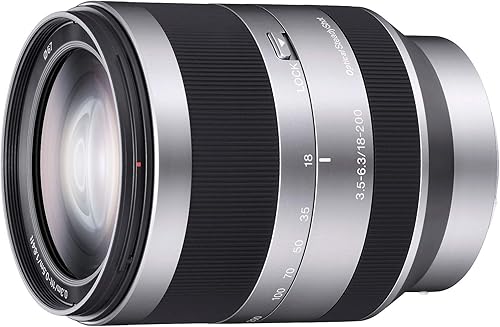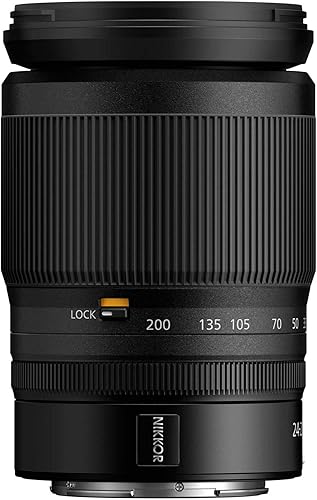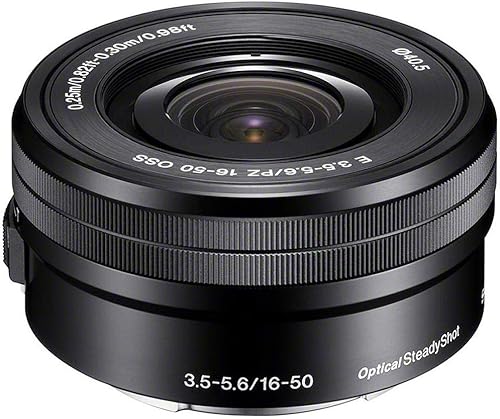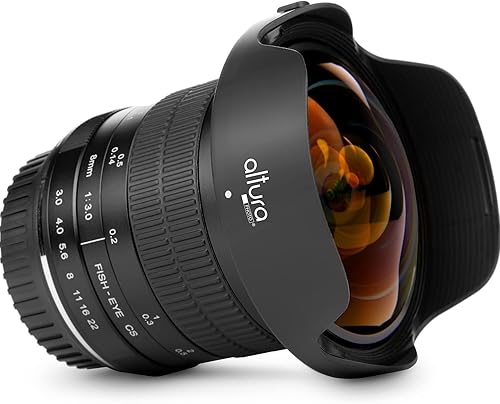Product Description The extremely wide 27mm to 300mm equivalent range (35mm full frame format) of this versatile E-mount zoom lens covers just about any shooting situation, and a newly developed internal drive motor offers smooth, quiet autofocus and aperture operation that are a distinct advantage when shooting movies. The internal Optical SteadyShot (OSS) image stabilization system with Active Mode offers effective stabilization even at the wide end of the zoom range when shooting movies. When changing your aperture to defocus the background, the light sources appear blurred. This ‘bokeh’ effect of the blurred background can be enhanced with circular aperture blades used in this lens. Conventional aperture blades have flat sides creating unappealing polygonal shaped defocussed points of light. α lenses overcome this problem through a unique design that keeps the aperture almost perfectly circular from its wide-open setting to when it is closed by 2 stops. Smoother, more natural defocusing can be obtained as a result. As focal lengths get longer, lenses built with conventional optical glass have difficulties with chromatic aberration, and as a result images suffer from lower contrast, lower color quality, and lower resolution. ED glass dramatically reduces chromatic aberration at telephoto ranges, and provides superior contrast across the entire image, even at large aperture settings. Super ED glass provides enhanced compensation for chromatic aberration. Aspherical lens design dramatically reduces spherical aberration while also reducing lens size and weight. Spherical aberration is a slight misalignment of the light rays projected on the image plane. This is caused by differences in refraction at different points on conventional spherical lenses which degrade image quality in large-aperture lenses. Specially shaped “aspherical” elements near the diaphragm restore alignment of light rays at the image plane, maintaining high sharpness and contrast even at maximum aperture and can also be used at other points in the optical path to reduce distortion. Well-designed aspherical elements can reduce the total number of elements required in the lens, thus reducing overall size and weight. Advanced Aspherical (AA) elements are an evolved variant, featuring an extremely high thickness ratio between the center and periphery. AA elements are exceedingly difficult to produce, relying on the most advanced molding technology to consistently and precisely achieve the required shape and surface accuracy, resulting in significantly improved image accuracy and quality. The distance encoder plays an integral part in ADI flash metering, which delivers high precision flash metering that is unaffected by the reflectance of subjects or backgrounds. The distance encoder is a lens component that directly detects the position of the focusing mechanism, and sends a signal to the CPU in order to measure distance to the subject. During flash photography, this data is very useful in calculating how much flash output is appropriate to the scene. Gyro sensors built into the lens detect even the slightest movement, and the stabilization lens is precisely shifted to counteract any image blur that might occur. The use of precision, quiet linear motors and technology inherited from high-end Sony professional camcorders results in exceptionally quiet, effective image stabilization that contributes to high-quality movies as well as stills. Only the middle groups of the optical system move to achieve focus, so the overall length of the lens does not change. Other important benefits include fast autofocusing and a short minimum focusing distance. Also, the filter thread at the front of the lens does not rotate, which is convenient if you’re using a polarizing filter. Moving around while shooting movies means more camera shake that can cause blur. Although conventional image stabilization systems were not effective at compensating for this type of movement, “Active Mode” employs a wider range of motion for the compensation lens, achieving improved stabilization over a greater range of camera movement. Stabilization at the wide end of the zoom range is significantly improved, facilitating handheld movie shooting with minimum image blur. 2010 Sony Electronics All rights reserved. Reproduction in whole or in part without written permission is prohibited. Sony is not responsible for typographic and photographic errors. Features and specifications are subject to change without notice. Sony, BIONZ, BRAVIA, BRAVIA Sync, Cyber-shot, Exmor, InfoLITHIUM, Memory Stick PRO Duo, Memory Stick Duo, the Memory Stick logo, Optical SteadyShot, Remote Commander, Smile Shutter, Stamina, SteadyShot, Theatre Sync, TruBlack, and Xtra Fine LCD are trademarks of Sony. Microsoft, Windows, and Windows Vista are trademarks of Microsoft Corporation. Mac OS and iMovie are trademarks of Apple Computers, HDMI is a trademark of HDMI Licensing . All other trademarks are trademarks of their respective owners. From the Manufacturer E 18-200mm F3.5-6.3 OSS Zoom LensThe extremely wide 27mm to 300mm equivalent range (35mm full frame format) of this versatile E-mount zoom lens covers just about any shooting situation, and a newly developed internal drive motor offers smooth, quiet autofocus and aperture operation that are a distinct advantage when shooting movies. The internal Optical SteadyShot (OSS) image stabilization system with Active Mode offers effective stabilization even at the wide end of the zoom range when shooting movies.TechnologyCircular ApertureWhen changing your aperture to defocus the background, the light sources appear blurred. This ‘bokeh’ effect of the blurred background can be enhanced with circular aperture blades used in this lens. Conventional aperture blades have flat sides creating unappealing polygonal shaped defocussed points of light. α lenses overcome this problem through a unique design that keeps the aperture almost perfectly circular from its wide-open setting to when it is closed by 2 stops. Smoother, more natural defocusing can be obtained as a result.ED (Extra-low Dispersion) glassAs focal lengths get longer, lenses built with conventional optical glass have difficulties with chromatic aberration, and as a result images suffer from lower contrast, lower color quality, and lower resolution. ED glass dramatically reduces chromatic aberration at telephoto ranges, and provides superior contrast across the entire image, even at large aperture settings. Super ED glass provides enhanced compensation for chromatic aberration.Aspherical lens elementsAspherical lens design dramatically reduces spherical aberration while also reducing lens size and weight. Spherical aberration is a slight misalignment of the light rays projected on the image plane. This is caused by differences in refraction at different points on conventional spherical lenses which degrade image quality in large-aperture lenses. Specially shaped “aspherical” elements near the diaphragm restore alignment of light rays at the image plane, maintaining high sharpness and contrast even at maximum aperture and can also be used at other points in the optical path to reduce distortion. Well-designed aspherical elements can reduce the total number of elements required in the lens, thus reducing overall size and weight. Advanced Aspherical (AA) elements are an evolved variant, featuring an extremely high thickness ratio between the center and periphery. AA elements are exceedingly difficult to produce, relying on the most advanced molding technology to consistently and precisely achieve the required shape and surface accuracy, resulting in significantly improved image accuracy and quality.Distance encoderThe distance encoder plays an integral part in ADI flash metering, which delivers high precision flash metering that is unaffected by the reflectance of subjects or backgrounds. The distance encoder is a lens component that directly detects the position of the focusing mechanism, and sends a signal to the CPU in order to measure distance to the subject. During flash photography, this data is very useful in calculating how much flash output is appropriate to the scene.Lens-based optical image stabilizationGyro sensors built into the lens detect even the slightest movement, and the stabilization lens is precisely shifted to counteract any image blur that might occur. The use of precision, quiet linear motors and technology inherited from high-end Sony professional camcorders results in exceptionally quiet, effective image stabilization that contributes to high-quality movies as well as stills.Additional FeaturesInternal focusingOnly the middle groups of the optical system move to achieve focus, so the overall length of the lens does not change. Other important benefits include fast autofocusing and a short minimum focusing distance. Also, the filter thread at the front of the lens does not rotate, which is convenient if you’re using a polarizing filter.Optical image stabilization with Active ModeMoving around while shooting movies means more camera shake that can cause blur. Although conventional image stabilization systems were not effective at compensating for this type of movement, “Active Mode” employs a wider range of motion for the compensation lens, achieving improved stabilization over a greater range of camera movement. Stabilization at the wide end of the zoom range is significantly improved, facilitating handheld movie shooting with minimum image blur.2010 Sony Electronics Inc. All rights reserved. Reproduction in whole or in part without written permission is prohibited. Sony is not responsible for typographic and photographic errors. Features and specifications are subject to change without notice. Sony, BIONZ, BRAVIA, BRAVIA Sync, Cyber-shot, Exmor, InfoLITHIUM, Memory Stick PRO Duo, Memory Stick Duo, the Memory Stick logo, Optical SteadyShot, Remote Commander, Smile Shutter, Stamina, SteadyShot, Theatre Sync, TruBlack, and Xtra Fine LCD are trademarks of Sony. Microsoft, Windows, and Windows Vista are trademarks of Microsoft Corporation. Mac OS and iMovie are trademarks of Apple Computers, Inc. HDMI is a trademark of HDMI Licensing LLC. All other trademarks are trademarks of their respective owners.











